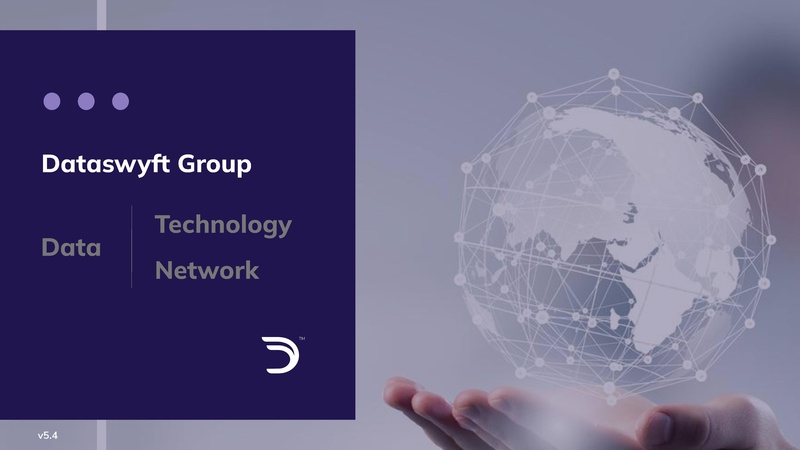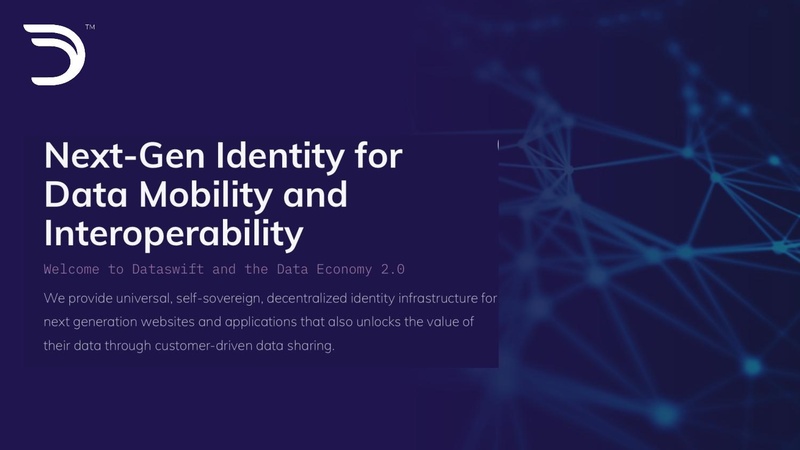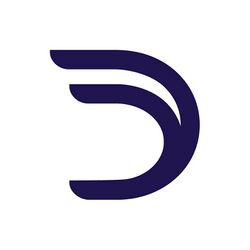Dataswyft: Difference between revisions
No edit summary |
No edit summary |
||
| (17 intermediate revisions by 2 users not shown) | |||
| Line 3: | Line 3: | ||
|sector=Cybersecurity and Privacy, Data | |sector=Cybersecurity and Privacy, Data | ||
|industry=Software & Services | |industry=Software & Services | ||
|type=Limited Liability | |chapter=Self-Sovereign Data, Decentralized Data | ||
|type=Limited Liability | |||
|foundation=October 2015 | |foundation=October 2015 | ||
|founder=Irene Ng, Paul Tasker | |founder=Irene Ng, Paul Tasker | ||
|location_city=Cambridge | |location_city=Cambridge UK | ||
|location_country=United Kingdom | |location_country=United Kingdom | ||
|area_served=Worldwide | |area_served=Worldwide | ||
|key_people=Irene Ng, Paul Tasker | |key_people=Irene Ng, Paul Tasker, Tyler Weir | ||
|products= | |products=Data Accounts, Dataswyft System APIs | ||
|num_employees=15 | |num_employees=15 | ||
|homepage=https://www. | |homepage=https://www.Dataswyft.com | ||
|sponsorship=Sponsor | |sponsorship=Sponsor | ||
|description='''Operator of data server infrastructure technology that decentralises the legal ownership of data to individuals and organizations''', enabling identity authentication / data storage / computation / sharing at a lower cost and risk to all parties, with | |description='''Operator of data server infrastructure technology that decentralises the legal ownership of data to individuals and organizations''', creating “self-sovereign data”, and enabling identity authentication / self-sovereign data storage / computation / sharing at a lower cost and risk to all parties, with data portability across geographical territories. The infrastructure enables decentralised data networks to be formed between individuals and organisations, with secure interactions, verifiable information, resulting in improved coordination for the benefit of everyone and society. | ||
}} | }} | ||
''' | '''Dataswyft is a data technology and network group with a mission to unlock the value of data by enabling everyone (individuals and businesses) to produce, store, process, use and share their self-sovereign data.''' | ||
'''The company was formed as a spin out company from the 6 U.K. Universities [https://gow.epsrc.ukri.org/NGBOViewGrant.aspx?GrantRef=EP/K039911/1 £1.2m UK Research funded Hub-of-All-Things (HAT) Project]'''. It was formed alongside the [https://www.hatcommunity.org HAT Community Foundation (HCF)], whom, with independent board members, serve as the regulator of | '''The company was formed as a spin out company from the 6 U.K. Universities [https://gow.epsrc.ukri.org/NGBOViewGrant.aspx?GrantRef=EP/K039911/1 £1.2m UK Research funded Hub-of-All-Things (HAT) Project]'''. It was formed alongside the [https://www.hatcommunity.org HAT Community Foundation (HCF)], whom, with independent board members, serve as the regulator of Dataswyft. | ||
'''The infrastructure technology is the legal, governance and operational plumbing for | '''The infrastructure technology is the legal, governance and operational plumbing for self-sovereign data interactions globally.''' Cloud System-agnostic data servers (the hubs or nodes) are provisioned on-demand for natural persons (individuals) and legal persons (corporations) decentralising the legal ownership of their data from centralised systems by providing self-sovereign storage and computation space with full IP rights to re-share. This legal and technical decentralisation enables data networks to be deployed and accessed through “Data Passports” and “Merchant Data Terminals”. "Data Passes" APIs (the description of the bundle of data to be shared) normalise data attributes, either on a PII or zero-PII basis, to enable data owners to dynamically access and license requested information amongst themselves. | ||
'''At-scale, the infrastructure is Web 3.0, pre-scale it is an alternative to GDPR-constrained centralised data silo models''' allowing secure B2B, B2C and B2B2C interactions. The technology is interoperable with any existing tech stack or network; and, can be designed and deployed in manners that behave like a centralised system, for ease-of-use, whilst underneath being a decentralised network with all its technical, legal and operational benefits. | '''At-scale, the infrastructure is Web 3.0, pre-scale it is an alternative to GDPR-constrained centralised data silo models''' allowing secure B2B, B2C and B2B2C interactions. The technology is interoperable with any existing tech stack or network; and, can be designed and deployed in manners that behave like a centralised system, for ease-of-use, whilst underneath being a decentralised network with all its technical, legal and operational benefits. | ||
| Line 37: | Line 38: | ||
'''The technology is a combination of a technical, legal and governance policy stack''' for approving contracts generated on-demand in the network between individuals and applications/websites of organisations, executed under the regulatory oversight of the HAT Community Foundation. | '''The technology is a combination of a technical, legal and governance policy stack''' for approving contracts generated on-demand in the network between individuals and applications/websites of organisations, executed under the regulatory oversight of the HAT Community Foundation. | ||
[[File:Dataswift-Intro.pdf|800px|center|Introduction]] | |||
=Products= | =Products= | ||
''' | '''Dataswyft One'''. Dataswyft deployed the open sourced [https://hubofallthings.com HAT Microserver] into the cloud and built the technical and legal services to enable the scalable provision of Personal Data Servers on demand, and to enable on-demand legal contracts to be set up for applications/websites access into specified namespaces of the databases (the Personal Data Accounts). Contracts are pre-set up under a governance framework before an Application can go live on the platform. The wrapping of technical, legal and governance services is a patented technology of Dataswyft’s personal data management infrastructure called Dataswyft One, enabling developers to integrate Personal Data Accounts (PDAs) as the back-end storage of their own apps the way they are able to do the same with centralised systems. PDAs provide authentication, file storage, per-user databases, and serverless "edge-AI" functions via API to enable Applications to have greater choices in their privacy-by-design architectures and [https://docs.dataswyft.com/knowledge-base/pda-design-patterns design patterns] that combine centralised and decentralised systems. Dataswyft provide developers with infrastructure (compute, storage, database), APIs, and SDKs to build apps that are compliant with strict new privacy laws like GDPR and CCPA. Dataswyft One also enables secure and legal transactions and sharing of sensitive personal data through the individual by being able to transform third and first party data to zero party data for licensing by individuals themselves. | ||
[[File:DS Intro Deck v3.0.pdf|800px|center|Introduction]] | |||
''' | '''Data Passport System'''. The Data Passport system is a suite of technical services that builds on Dataswyft One’s decentralised capability to enable organisations to create data networks. It comprises of 3 services - (1) Data Connector Services to bring source data into PDAs, (2) A Data Passport Service to display data within a consumer app and (3) a Merchant Data Terminal Service to receive data from a PDA when the individual shares it. The Data Passport issuer create Data Passes - a description of a bundle of data within a PDA that can attract complementary services (offers) from partners within a network, usually called a Merchant. Should a user wishes to go to the merchant and accept their offer, the merchant will benefit from the audience, the data, or both. Any data transaction would result in a licensing of the PDA data described on the Data Pass from the individual to the merchant. | ||
'''Dataswyft Prime'''. Dataswyft One’s sister platform for Organisations with their own Organisation Data Servers. This platform is part of Dataswyft’s Enterprise Solution with Economic and Business Model Frameworks for centralised, decentralised and distributed data architectures to assist enterprises in creating value with data. | |||
=Governance= | =Governance= | ||
Data stored within Personal Data Accounts on the | Data stored within Personal Data Accounts on the Dataswyft One platform is out of scope of global data regulations due to individuals being the data controllers and processors of their own data. Hence, a governance and regulatory framework was put in place, guided by the original research project on how the ecosystem should be organised, managed and regulated. This is part of the "institutional rearrangement" of the ecosystem using a combination of technology, markets and regulatory controls. | ||
The company is governed on 2 levels by HCF. At the corporate level, HCF owns a guardian share of | The company is governed on 2 levels by HCF. At the corporate level, HCF owns a guardian share of Dataswyft and sits on its board, to ensure directors perform their fiduciary duty to uphold Dataswyft’s complementary social purpose “to operate for the public benefit, a digital exchange for the exchange of personal information including data processing, hosting and related activities”. At the operational level, HCF has oversight over Dataswyft One Platform through the Platform Management Committee that decides on any changes to various Platform policies, technical artefacts (e.g. APIs) and risk assessment of data contracts. Dataswyft cannot set up the contracts between Application owners and server owners if risks fall outside approved parameters set by the governance framework and the approval of the contract (and hence the app) would have to be escalated to HCF. Where there is ambiguity in contracts, the HCF Ethics Board would have to be consulted. Application owners have recourse to appeal to HCF in the unlikely event that a contract to use a PDA is denied. All PDS owners are members of HCF when they own a PDS and all Application owners are corporate members of HCF when their app goes live. As a consequence of the legal and governance framework, Dataswyft is able to be a fully commercial enterprise to scale its infrastructure and build new networks and markets that have not been possible before. | ||
=Business Model= | =Business Model= | ||
Dataswyft provide “Decentralization-as-a-service” (DCaaS) through a per PDA user per month fee starting from $0.10 with user inactivity rebates of up to 80% for numbers in access of 100k. DCaaS fee comes with standard Universal ID and client can add other functionalities such as 2FA, etc. | |||
Dataswyft also provide “Network-as-a-Service” once PDAs are integrated, enabling the app to have a Data Passport functionality and for the app to create “Data Passes” that can be matched with Partner services. Dataswyft provides a no-code onboarding of partners to offer services and content for the Data Passes. Network-as-a-service enables consumer app owners to derive income from creating a data network with their partners through listing, traffic and data sharing fees paid by Merchant Partners. The network income are distributed 50% to the Passport issuer and 50% to Dataswyft as network operator. | |||
Universal Data Passes such as income verification, age verification or National Passport verification are add-ons to a Data Passport that any app/website can incorporate. | Universal Data Passes such as income verification, age verification or National Passport verification are add-ons to a Data Passport that any app/website can incorporate. | ||
The Governance and Business Model of | The Governance and Business Model of Dataswyft was informed by the following grants: | ||
The original hub-of-all-Things [https://gow.epsrc.ukri.org/NGBOViewGrant.aspx?GrantRef=EP/K039911/1 HAT Project], [https://gow.epsrc.ukri.org/NGBOViewGrant.aspx?GrantRef=EP/K003542/2 Digital Economy 'New Economic Models' Network+], EP/K003542/2 (grant amount £580k), British Academy-SAMS Small Research Grant: Smart City and Smart Citizens: New Business and Economic Models of Urban Living, EP/L023911/1, (Grant Amount £10k), [https://gow.epsrc.ukri.org/NGBOViewGrant.aspx?GrantRef=EP/N028422/1 Control and Trust as Moderating Mechanisms in addressing Vulnerability for the Design of Business and Economic Models (ConTriVE)], EP/N028422/1 (Grant amount=£1m), [https://gow.epsrc.ukri.org/NGBOViewGrant.aspx?GrantRef=EP/L023911/1 RCUK/EPSRC Research in the Wild: Smart Me versus Smart Things: The Development of a Personal Resource Planning (PRP) System through Human Interactions with Data Enabled by the IoT] (Grant amount=£485k) | The original hub-of-all-Things [https://gow.epsrc.ukri.org/NGBOViewGrant.aspx?GrantRef=EP/K039911/1 HAT Project], [https://gow.epsrc.ukri.org/NGBOViewGrant.aspx?GrantRef=EP/K003542/2 Digital Economy 'New Economic Models' Network+], EP/K003542/2 (grant amount £580k), British Academy-SAMS Small Research Grant: Smart City and Smart Citizens: New Business and Economic Models of Urban Living, EP/L023911/1, (Grant Amount £10k), [https://gow.epsrc.ukri.org/NGBOViewGrant.aspx?GrantRef=EP/N028422/1 Control and Trust as Moderating Mechanisms in addressing Vulnerability for the Design of Business and Economic Models (ConTriVE)], EP/N028422/1 (Grant amount=£1m), [https://gow.epsrc.ukri.org/NGBOViewGrant.aspx?GrantRef=EP/L023911/1 RCUK/EPSRC Research in the Wild: Smart Me versus Smart Things: The Development of a Personal Resource Planning (PRP) System through Human Interactions with Data Enabled by the IoT] (Grant amount=£485k) | ||
=Economic Model= | =Economic Model= | ||
The Data Passport issuer networks designed and implemented by | The Data Passport issuer networks designed and implemented by Dataswyft is a combination of technical code, “[https://en.wikipedia.org/wiki/Institutional_theory institutional]” work and [https://en.wikipedia.org/wiki/Market_design market design]. The system architecture incorporates technical service oriented architecture, institutional rearrangements and the redesign of economic data transactions and its locations. This enable a two-sided network to form for every Data Passport issuer from within their own consumer app. This two-sided network can be used by a Data Passport Issuer as an advertising network, a loyalty program with partners, a data sharing collaboration (e.g. collaborative credit scores), a data marketplace, or a health services network (e.g. coordinated health campaigns) to complement the issuer's existing app. | ||
The Economic Model of the | The Economic Model of the Dataswyft ecosystem was informed by the following grants: | ||
[https://gow.epsrc.ukri.org/NGBOViewGrant.aspx?GrantRef=EP/P011896/1 ACCEPT: Addressing Cybersecurity and Cybercrime via a co-Evolutionary aPproach to reducing human-relaTed risks], EP/P011896/1 (Grant amount=£1m), [https://gow.epsrc.ukri.org/NGBOViewGrant.aspx?GrantRef=EP/R033838/1 RCUK Dynamic, Real Time, On-Demand Personalisation for Scaling (DROPS) EP/R033838/1] (Grant amount £1.1m), Alan Turing Institute Fellowship 2019-21 (grant amount £45k) and the [https://www.uel.ac.uk/our-research/sustainability-research-institute-sri/eastern-new-energy-project Eastern New Energy European Regional Development Fund] project. | [https://gow.epsrc.ukri.org/NGBOViewGrant.aspx?GrantRef=EP/P011896/1 ACCEPT: Addressing Cybersecurity and Cybercrime via a co-Evolutionary aPproach to reducing human-relaTed risks], EP/P011896/1 (Grant amount=£1m), [https://gow.epsrc.ukri.org/NGBOViewGrant.aspx?GrantRef=EP/R033838/1 RCUK Dynamic, Real Time, On-Demand Personalisation for Scaling (DROPS) EP/R033838/1] (Grant amount £1.1m), Alan Turing Institute Fellowship 2019-21 (grant amount £45k) and the [https://www.uel.ac.uk/our-research/sustainability-research-institute-sri/eastern-new-energy-project Eastern New Energy European Regional Development Fund] project. | ||
= | =Impact= | ||
The infrastructure has the potential to create a “special lane” on the Internet that enable trade/digital standards or markets to be created that integrates with institutional structures such as legal persons (organisations) and natural (legal) persons (individuals), property rights and contracts. It can also be used as a basis of taxation. The highly scalable but very thin layer of the infrastructure enable services to capture immense value above it and with a very low cost, enable inclusion of these services across all individuals in both developed and developing countries. | |||
=Funding= | |||
Dataswyft has obtained $6m in private funding. In 2022, a seed round of $2.4m was led by IQ Capital, a deep tech investor in Cambridge, UK. | |||
Revision as of 04:33, June 24, 2023
- Members
Operator of data server infrastructure technology that decentralises the legal ownership of data to individuals and organizations, creating “self-sovereign data”, and enabling identity authentication / self-sovereign data storage / computation / sharing at a lower cost and risk to all parties, with data portability across geographical territories. The infrastructure enables decentralised data networks to be formed between individuals and organisations, with secure interactions, verifiable information, resulting in improved coordination for the benefit of everyone and society.
Activities

|
CheckD Data Wallet: Eat2Give | |
| The EAT2GIVE project in Subang Jaya, Malaysia, leverages the CheckD Data Wallet to unite food lovers, local businesses, and charities in a unique fundraising initiative. By claiming the EAT2GIVE campaign badge on their CheckD wallets, food enthusiasts can support local causes every time they purchase designated menu items at participating food merchants, who pledge RM3 per validation to charity. This innovative campaign promotes community engagement and philanthropy while maintaining user privacy, enabling merchants to boost foot traffic cost-effectively, and providing organizers with seamless validation and transparent reporting. Driven by a partnership between Dataswyft, SubangFood, and TheBFG.team, EAT2GIVE fosters a culture of doing good through commerce, connecting residents and businesses in a shared purpose to strengthen the Subang Jaya community.
'"`UNIQ--item-1093--QINU`"' | ||

|
Citizen App | |
| Citizen App, the first of its kind, empower individuals to claim and legally own their data from across multiple sources, then use it securely and seamlessly in everyday life. | ||

|
Hub of All Things | |
| The Hub of All Things (HAT) Microserver is a pioneering digital infrastructure that enables individuals, businesses, and organizations to take control of their personal data through self-sovereign data management. Built on over $50 million of UK research, the HAT Microserver separates data storage from application services, granting users full legal ownership of their data, even if it was generated by external entities like banks or hospitals. This technology transforms personal data into a new asset class known as "self-sovereign data," which retains intellectual property (IP) rights for the data producers, allowing them to safely and securely create value from it. Hosted by Dataswyft, the HAT Microserver is cloud-native, portable, and open-source, with pending patents for its deployment and protocols for data governance, offering a more secure, efficient, and governed approach to managing personal and organizational data in a decentralized environment. | ||

|
Mobelizing Data to Create Data Markets | |
| The boundary between the physical and the digital has disappeared. Our health, our finances, our shopping, our things - they are now fully digitized and exist in the form of data. This webinar will discuss how this data can be mobelized to create markets. The presentation will discuss 2 case studies on the markets forming around finance and health data. | ||
Details
Dataswyft is a data technology and network group with a mission to unlock the value of data by enabling everyone (individuals and businesses) to produce, store, process, use and share their self-sovereign data.
The company was formed as a spin out company from the 6 U.K. Universities £1.2m UK Research funded Hub-of-All-Things (HAT) Project. It was formed alongside the HAT Community Foundation (HCF), whom, with independent board members, serve as the regulator of Dataswyft.
The infrastructure technology is the legal, governance and operational plumbing for self-sovereign data interactions globally. Cloud System-agnostic data servers (the hubs or nodes) are provisioned on-demand for natural persons (individuals) and legal persons (corporations) decentralising the legal ownership of their data from centralised systems by providing self-sovereign storage and computation space with full IP rights to re-share. This legal and technical decentralisation enables data networks to be deployed and accessed through “Data Passports” and “Merchant Data Terminals”. "Data Passes" APIs (the description of the bundle of data to be shared) normalise data attributes, either on a PII or zero-PII basis, to enable data owners to dynamically access and license requested information amongst themselves.
At-scale, the infrastructure is Web 3.0, pre-scale it is an alternative to GDPR-constrained centralised data silo models allowing secure B2B, B2C and B2B2C interactions. The technology is interoperable with any existing tech stack or network; and, can be designed and deployed in manners that behave like a centralised system, for ease-of-use, whilst underneath being a decentralised network with all its technical, legal and operational benefits.
In-action: organisations can decentralise storage of personal data they hold of their customers into a customer-owned “Personal Data Account” (PDA) within the individual’s server. Thus, enabling:
(1) the individual to have full access and control of their own data for ethical, compliance and regulatory purposes,
(2) the organisation to reduce its legal exposure and OPEX by not storing the data whilst still deriving the required information from it,
(3) the individual to seamlessly and retractably share data, given to them by the organisation, through Data Passes, with the organisation’s partners,
(4) the organisation to legally and scalably derive economic benefit from their customer’s data via their customers who share to receive complementary services and benefits, and
(5) edge computation where critical insights are drawn from highly sensitive information, without data having to leave the server, to deliver highly-personalised and proactive services (for example, multiple health records, FitBit data and spending records can be analysed by a hospitals in-server AI to provide a 'liver' risk score that's sent to doctors who proactively monitor patient health and message individuals to give advice or suggest dietary changes).
The technology is a combination of a technical, legal and governance policy stack for approving contracts generated on-demand in the network between individuals and applications/websites of organisations, executed under the regulatory oversight of the HAT Community Foundation.

Products
Dataswyft One. Dataswyft deployed the open sourced HAT Microserver into the cloud and built the technical and legal services to enable the scalable provision of Personal Data Servers on demand, and to enable on-demand legal contracts to be set up for applications/websites access into specified namespaces of the databases (the Personal Data Accounts). Contracts are pre-set up under a governance framework before an Application can go live on the platform. The wrapping of technical, legal and governance services is a patented technology of Dataswyft’s personal data management infrastructure called Dataswyft One, enabling developers to integrate Personal Data Accounts (PDAs) as the back-end storage of their own apps the way they are able to do the same with centralised systems. PDAs provide authentication, file storage, per-user databases, and serverless "edge-AI" functions via API to enable Applications to have greater choices in their privacy-by-design architectures and design patterns that combine centralised and decentralised systems. Dataswyft provide developers with infrastructure (compute, storage, database), APIs, and SDKs to build apps that are compliant with strict new privacy laws like GDPR and CCPA. Dataswyft One also enables secure and legal transactions and sharing of sensitive personal data through the individual by being able to transform third and first party data to zero party data for licensing by individuals themselves.

Data Passport System. The Data Passport system is a suite of technical services that builds on Dataswyft One’s decentralised capability to enable organisations to create data networks. It comprises of 3 services - (1) Data Connector Services to bring source data into PDAs, (2) A Data Passport Service to display data within a consumer app and (3) a Merchant Data Terminal Service to receive data from a PDA when the individual shares it. The Data Passport issuer create Data Passes - a description of a bundle of data within a PDA that can attract complementary services (offers) from partners within a network, usually called a Merchant. Should a user wishes to go to the merchant and accept their offer, the merchant will benefit from the audience, the data, or both. Any data transaction would result in a licensing of the PDA data described on the Data Pass from the individual to the merchant.
Dataswyft Prime. Dataswyft One’s sister platform for Organisations with their own Organisation Data Servers. This platform is part of Dataswyft’s Enterprise Solution with Economic and Business Model Frameworks for centralised, decentralised and distributed data architectures to assist enterprises in creating value with data.
Governance
Data stored within Personal Data Accounts on the Dataswyft One platform is out of scope of global data regulations due to individuals being the data controllers and processors of their own data. Hence, a governance and regulatory framework was put in place, guided by the original research project on how the ecosystem should be organised, managed and regulated. This is part of the "institutional rearrangement" of the ecosystem using a combination of technology, markets and regulatory controls.
The company is governed on 2 levels by HCF. At the corporate level, HCF owns a guardian share of Dataswyft and sits on its board, to ensure directors perform their fiduciary duty to uphold Dataswyft’s complementary social purpose “to operate for the public benefit, a digital exchange for the exchange of personal information including data processing, hosting and related activities”. At the operational level, HCF has oversight over Dataswyft One Platform through the Platform Management Committee that decides on any changes to various Platform policies, technical artefacts (e.g. APIs) and risk assessment of data contracts. Dataswyft cannot set up the contracts between Application owners and server owners if risks fall outside approved parameters set by the governance framework and the approval of the contract (and hence the app) would have to be escalated to HCF. Where there is ambiguity in contracts, the HCF Ethics Board would have to be consulted. Application owners have recourse to appeal to HCF in the unlikely event that a contract to use a PDA is denied. All PDS owners are members of HCF when they own a PDS and all Application owners are corporate members of HCF when their app goes live. As a consequence of the legal and governance framework, Dataswyft is able to be a fully commercial enterprise to scale its infrastructure and build new networks and markets that have not been possible before.
Business Model
Dataswyft provide “Decentralization-as-a-service” (DCaaS) through a per PDA user per month fee starting from $0.10 with user inactivity rebates of up to 80% for numbers in access of 100k. DCaaS fee comes with standard Universal ID and client can add other functionalities such as 2FA, etc.
Dataswyft also provide “Network-as-a-Service” once PDAs are integrated, enabling the app to have a Data Passport functionality and for the app to create “Data Passes” that can be matched with Partner services. Dataswyft provides a no-code onboarding of partners to offer services and content for the Data Passes. Network-as-a-service enables consumer app owners to derive income from creating a data network with their partners through listing, traffic and data sharing fees paid by Merchant Partners. The network income are distributed 50% to the Passport issuer and 50% to Dataswyft as network operator.
Universal Data Passes such as income verification, age verification or National Passport verification are add-ons to a Data Passport that any app/website can incorporate.
The Governance and Business Model of Dataswyft was informed by the following grants:
The original hub-of-all-Things HAT Project, Digital Economy 'New Economic Models' Network+, EP/K003542/2 (grant amount £580k), British Academy-SAMS Small Research Grant: Smart City and Smart Citizens: New Business and Economic Models of Urban Living, EP/L023911/1, (Grant Amount £10k), Control and Trust as Moderating Mechanisms in addressing Vulnerability for the Design of Business and Economic Models (ConTriVE), EP/N028422/1 (Grant amount=£1m), RCUK/EPSRC Research in the Wild: Smart Me versus Smart Things: The Development of a Personal Resource Planning (PRP) System through Human Interactions with Data Enabled by the IoT (Grant amount=£485k)
Economic Model
The Data Passport issuer networks designed and implemented by Dataswyft is a combination of technical code, “institutional” work and market design. The system architecture incorporates technical service oriented architecture, institutional rearrangements and the redesign of economic data transactions and its locations. This enable a two-sided network to form for every Data Passport issuer from within their own consumer app. This two-sided network can be used by a Data Passport Issuer as an advertising network, a loyalty program with partners, a data sharing collaboration (e.g. collaborative credit scores), a data marketplace, or a health services network (e.g. coordinated health campaigns) to complement the issuer's existing app.
The Economic Model of the Dataswyft ecosystem was informed by the following grants:
ACCEPT: Addressing Cybersecurity and Cybercrime via a co-Evolutionary aPproach to reducing human-relaTed risks, EP/P011896/1 (Grant amount=£1m), RCUK Dynamic, Real Time, On-Demand Personalisation for Scaling (DROPS) EP/R033838/1 (Grant amount £1.1m), Alan Turing Institute Fellowship 2019-21 (grant amount £45k) and the Eastern New Energy European Regional Development Fund project.
Impact
The infrastructure has the potential to create a “special lane” on the Internet that enable trade/digital standards or markets to be created that integrates with institutional structures such as legal persons (organisations) and natural (legal) persons (individuals), property rights and contracts. It can also be used as a basis of taxation. The highly scalable but very thin layer of the infrastructure enable services to capture immense value above it and with a very low cost, enable inclusion of these services across all individuals in both developed and developing countries.
Funding
Dataswyft has obtained $6m in private funding. In 2022, a seed round of $2.4m was led by IQ Capital, a deep tech investor in Cambridge, UK.




